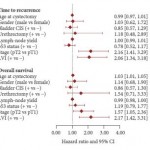Editorial: Can we rely on LVI to determine the need for adjuvant chemotherapy in organ-confined bladder cancer?
The authors of this paper [1] are to be congratulated on exploring lymphovascular invasion (LVI) as a possible singular prognostic marker for time to recurrence and overall survival (OS) in a post hoc analysis of a prospective randomized study that originally explored adjuvant methotrexate, vinblastine, doxorubicin and cisplatin chemotherapy after radical cystectomy based on p53 status. This study is the largest prospective study to date looking at the outcome of LVI in organ-confined urothelial cancer of the bladder.
Lymphovascular invasion represents the first step of dissemination of tumour cells into the lymphatic and blood system which may lead to the formation of metastatic clones. In bladder cancer, our current understanding of the predictive and prognostic role of LVI is mainly based on retrospective data, which are inherently flawed by various selection biases. As pathological tumour and nodal stage, as well as soft-tissue surgical margins, are stronger predictors than is LVI for outcomes in advanced bladder cancer, the authors specifically limited their analysis to the group of patients exhibiting organ-confined disease at radical cystectomy. They found that LVI was associated with time to recurrence and death, while a significant benefit of adjuvant chemotherapy could not be confirmed in a small group of 27 patients with altered p53 expression and LVI. The authors concluded that, although their study did not show a survival benefit for adjuvant chemotherapy in patients with LVI, a possible benefit could not be finally excluded [1].
Indeed, there is still uncertainty about the beneficial impact of adjuvant chemotherapy in bladder cancer. While previous meta-analyses could not show a significant prognostic advantage, a recent update of 945 patients who received adjuvant chemotherapy within nine randomized trials has emphasized its prognostic benefit, especially in lymph node-positive disease [2]. By contrast, a recent report from the European Organisation for the Research and Treatment of Cancer intergroup trial suggests that only patients with node-negative pT3–T4 tumours exhibiting LVI benefit from adjuvant chemotherapy [3]. These heterogeneous data make it difficult to specifically recommend adjuvant chemotherapy in invasive bladder cancer.
The aim of the present study was (and definitely has to be in the future) to outline those patients who do not belong to the roughly 80% of patients who are cured by radical cystectomy without any additional systemic therapy in localized disease. What has been shown in this study is that the presence of LVI definitely influences postoperative outcome. What has not been shown is whether a more or less careful diagnosis of LVI influences time to recurrence and OS after adjuvant chemotherapy, similarly to a negative outcome with regard to p53 status. Do we now believe the two main messages of this paper, which are that LVI does not help us in our decision about which patients might need adjuvant chemotherapy and that there is no room for the argument that adjuvant chemotherapy is better than neoadjuvant chemotherapy because of the histological evidence of LVI?
We are in desperate need of markers [4] in light of the recent literature showing that both neoadjuvant and adjuvant chemotherapy will improve survival in patients with cystectomy as a result of urothelial cancer [5]. Despite the fact that this is one of the largest series of patients with LVI in the specimen, the series is much too incoherent because no central pathology, no mandatory immunohistochemistry, and not even mandatory evaluation of the status in the individual institutions was carried out. We do not even know whether quality control of the pathological evaluations was carried out within each pathology department or hospital, as is mandatory in some parts of the world.
Furthermore, in organ-confined bladder cancer, the invasion depth of the tumour is a key prognosticator of recurrence. In the present study, the only variable associated with a higher risk of LVI was found to be pathological stage (pT1 vs pT2); however, substratification in pT2N0 bladder cancer has also been shown to be of prognostic importance for predicting recurrence after cystectomy [4]. The unknown anatomical extent of lymph node dissection at radical cystectomy makes it difficult to assess the impact of LVI on outcomes because patients with localized tumours and presumed micrometastatic disease (as suggested by LVI) may still be cured with an extended pelvic lymph node dissection [6]. While the authors tried to adjust for this bias by reporting on the number of retrieved lymph nodes, 30% of their patients had < 15 lymph nodes removed at surgery.
In conclusion, the authors of the present study address very important questions, but they fail to provide a clear answer that will change current clinical practice.



